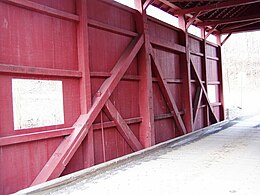Queen post
 Interior structure of a covered bridge that uses a queen-post structure | |
| Ancestor | Truss bridge |
|---|---|
| Related | None |
| Descendant | None |
| Carries | Pedestrians, livestock, vehicles |
| Span range | short to medium |
| Material | wood planks |
| Movable | No |
| Design effort | medium |
| Falsework required | Sometimes |
A queen post is a tension member in a truss that can span longer openings than a king post truss. A king post uses one central supporting post, whereas the queen post truss uses two.[1] Even though it is a tension member, rather than a compression member, they are commonly still called a post. A queen post is often confused with a queen strut, one of two compression members in roof framing which do not form a truss in the engineering sense.[2]
The double punch truss appeared in Central Europe during the Renaissance.[3]
Architecture

A queen-post bridge has two uprights, placed about one-third of the way from each end of the truss. They are connected across the top by a beam and use a diagonal brace between the outer edges. The central square between the two verticals is either unbraced (on shorter spans), or has one or two diagonal braces for rigidity. A single diagonal reaches between opposite corners; two diagonal braces may either reach from the bottom of each upright post to the center of the upper beam, or form a corner-to-corner "X" inside the square.[4]
See also
References
- ^ Gopi, Satheesh. Basic civil engineering. New Delhi: Dorling Kindersley (India) Pvt. Ltd., 2010. 155. Print. ISBN 8131729885
- ^ "Timber Framing for Beginners: VI. Glossary of Terms" Timber Framing Vol. 68 June 2003. 12. "Archived copy" (PDF). Archived from the original (PDF) on December 7, 2012. Retrieved December 10, 2012.
{{cite web}}: CS1 maint: archived copy as title (link) - ^ Lefrançois, Richard (2004). Les nouvelles frontières de l'âge. Presses de l’Université de Montréal. doi:10.4000/books.pum.18081. ISBN 978-2-7606-1963-0.
- ^ American Barns and Covered Bridges, Eric Sloane, Wilfred Funk, Inc. New York, New York; 1954, pg 96-97
External links
